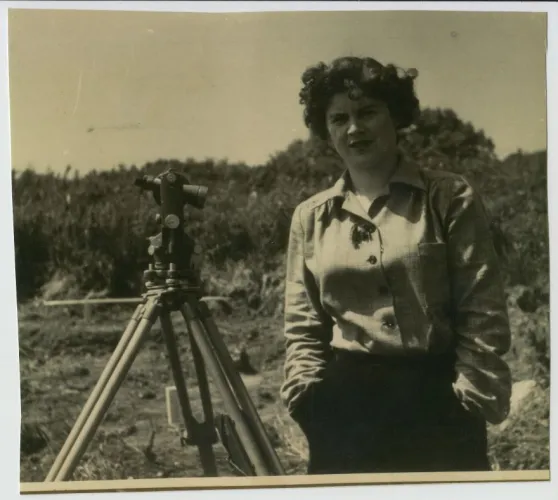Time: 3:00 4:30 pm
Location: Zoom Webinar
Registration: https://us02web.zoom.us/webinar/register/WN_tQfB-U1_SPOEWVUS6rZjZA
Access to brick-and-mortar archives has been limited due to COVID-19 restrictions, creating challenges for humanities researchers that rely on archival materials for their research. DRI is therefore hosting a three-part public lecture series on using digital archives for academic research showcasing the rich research resources contained in digital archival collections. The third webinar in the series, 'Using Digital Archives for Social Sciences Research', takes place on Tuesday 20 April. Although the series is aimed primarily at early career researchers, the events are open to the public and all are welcome.
This event will take place over Zoom Webinar but it is not necessary to have a Zoom account to join. The webinar will be recorded and livestreamed to the DRI Facebook Page. Audience members will not be visible in the recording. The recording will be made available on the DRI website and Repository after the event.
Featured Collections include:
- ‘Repeal the Eighth and Reproductive Rights’ collection: This collection features 25 interviews conducted with Repeal activists from the project 'Sharing Best Practices in how Civil Society Organisations use the Internet in Organising and Building for Socio-Economic Rights and Trust'. This project looked at how organisations build trust and resolve conflicts in the age of social media. It looked at how in the Repeal campaign, digital tools were used to organise and build up the campaign, develop coalitions and connections, and also how the campaign dealt with the inevitable conflict that all movements have to handle.
- National Library of Ireland (NLI) web archival collections: Two NLI collections will be featured in the webinar talks. The NLI's General Election 2020 collection encompasses media sites, commentary, and news websites and covers the election campaign, the results, and government formation. NLI is also undertaking ongoing collection work of the Irish experience of Covid-19. This collection has over180 websites archived to date and collecting is continuing in 2021.
- Irish Women at Work Oral History Project: This is a collection of 42 oral history recordings, related transcripts, and artefacts collected as part of a feminist research project focused on women’s experiences of work and employment between the 1930s and 1960s. The interviews take a life course approach, focusing on women’s early family lives, education, entry into and experience of the workplace, marriage and motherhood. The narratives provide rich historical insights into diverse jobs, workplace practices, and working conditions. Gendered aspects of women’s lives were explored during interview, as were women’s thoughts on their individual and collective acceptance of, or resistance to, prevailing gender expectations.
- Life Histories and Social Change: This is a large collection of qualitative life story interviews with three cohorts of Irish citizens, each of which reached adulthood in the crucial decades of the 1950s (an era of socio-economic decline), the 1970s (an era of initial 'modernisation') and in the 1990s (the 'Celtic Tiger' boom). The research was funded by the Irish Research Council and a total of 113 life history interviews were conducted by researchers from Maynooth University between 2006 and 2008.
- RESCuE-Ireland collection: This collection was created as part of a cross-national European project that aimed to identify the contexts and practices associated with household resilience to the financial crisis of 2008. The dataset consists of 25 narrative interviews with people living in urban and rural settings in an Irish Midlands district.
Speakers include:
- David Landy: David is director of the Masters in Race, Ethnicity, Conflict in Trinity College Dublin. His research interests are in the fields of international solidarity, social movements, race and ethnicity. He is the author of Jewish Identity and Palestinian Rights: Diaspora Jewish Opposition to Israel and recently coedited Enforcing Silence: Academic Freedom, Palestine and the Criticism of Israel.
- Maria Ryan: Maria is the web archivist at the National Library of Ireland (NLI). A qualified archivist, she has previously worked in the National University of Ireland, Galway. She currently serves as co-chair of the training group of the International Internet Preservation Consortium (IIPC) and as part of the steering committee of the Digital Preservation Coalition’s (DPC) Web Archiving working group.
- Elizabeth Kiely: Elizabeth is a senior lecturer in social policy in the School of Applied Social Studies and Co-Chair of the Board of Women’s Studies in UCC. She teaches and researches in the fields of penal policy, youth policy, feminist research methodology and ethics. She is presently Chair of her University’s Research Ethics Committee. She recently completed a book entitled The Criminalisation of Social Policy, which she co-authored with Dr Katharina Swirak. It is currently in print and due to be published later this year by Bristol University Press.
- Jane Gray: Jane is Professor of Sociology at Maynooth University. Her scholarship centres on questions relating to families, households and social change, with a particular focus on biographical life course analysis. She was national co-ordinator for Ireland on the recently completed FP7 funded project RESCuE: Citizens’ Resilience in Times of Crisis, and co-edited the book Poverty, Crisis and Resilience (Edward Elgar, 2020) with Marie Boost, Jennifer Dagg and Markus Promberger. She has a longstanding interest in sharing and re-using qualitative social science data.
The event will be chaired by DRI Policy Manager, Dr Aileen O'Carroll.
Registered attendees will receive a DRI Publication called 'Using Digital Archives for Academic Research'. This publication was developed to support the series and highlights additional digital archival collections that early career researchers can explore.
Image Credit: Catherine Walshe, engineer, Digital Repository of Ireland [Distributor], University College Cork [Depositing Institution], https://doi.org/10.7486/DRI.s752kt24j-1
DRI operates in compliance with GDPR. Please see our Privacy Statement for more information about our use of your data. https://www.dri.ie/dri-privacy-statement






